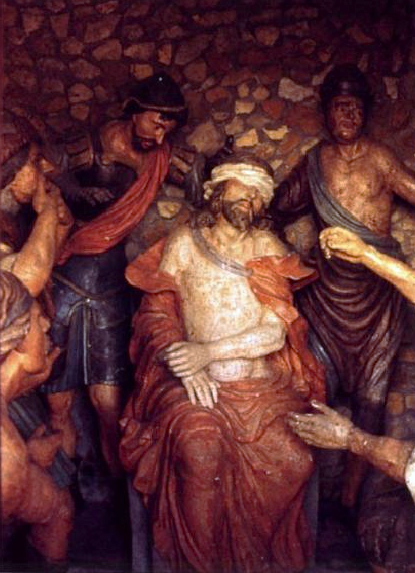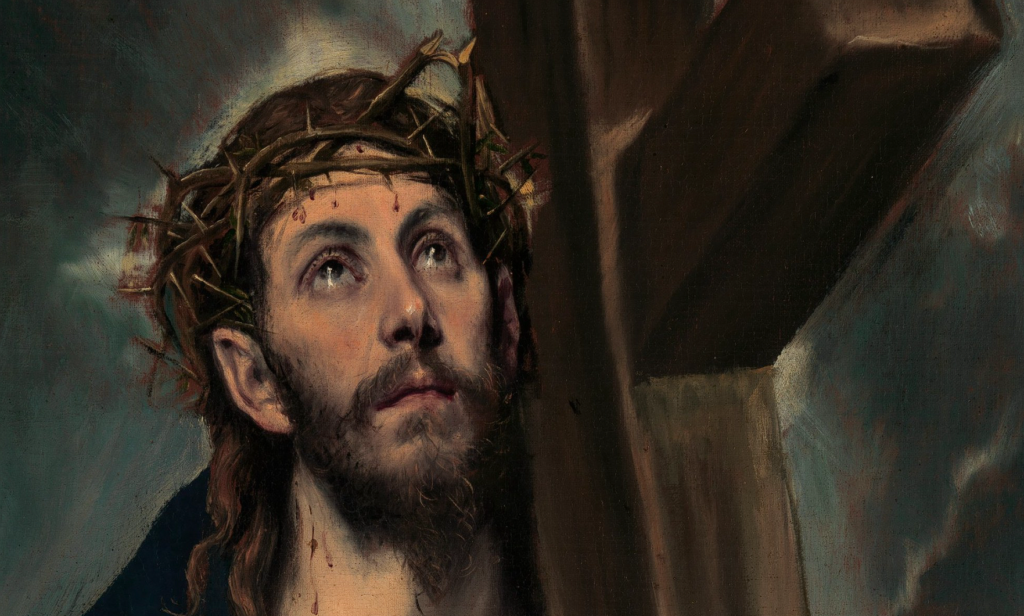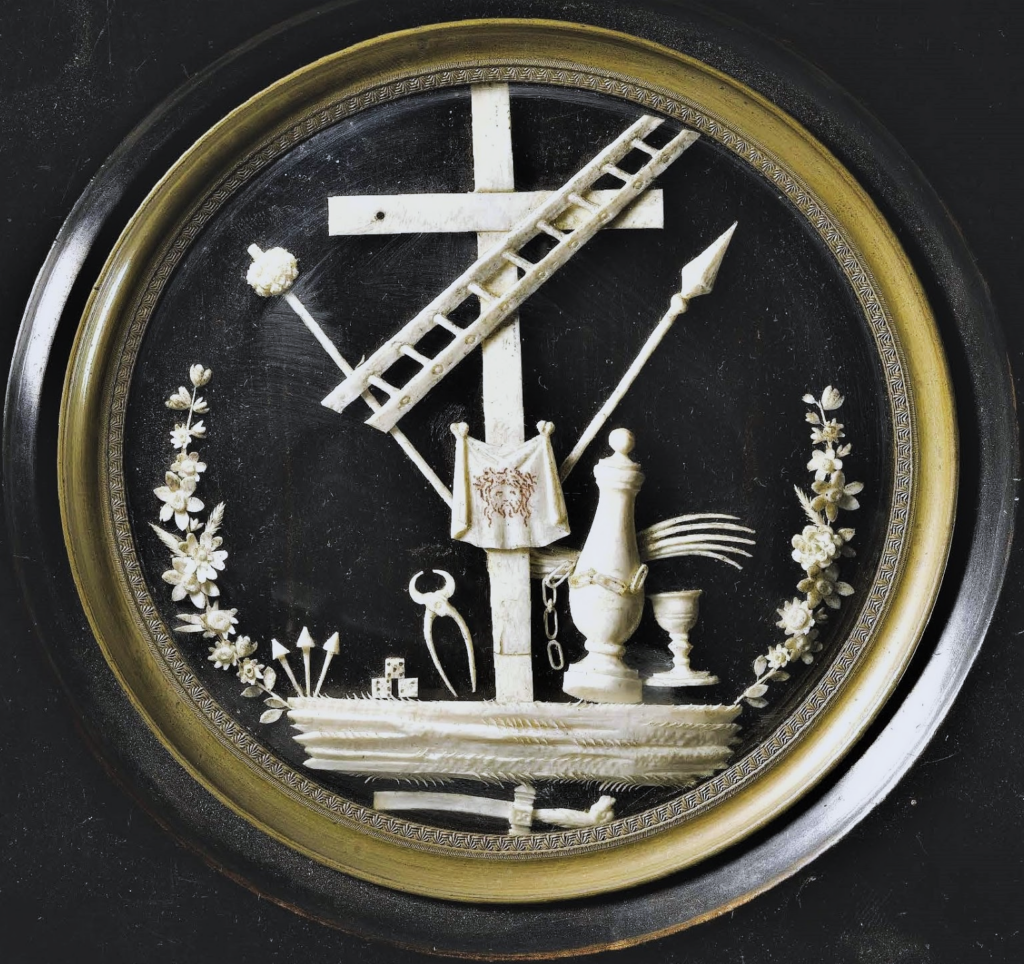Translation of the Holy Gospel According to Luke
At that time Jesus took unto Him the twelve and said to them: Behold, we go up to Jerusalem, and all things shall be accomplished which were written by the Prophets concerning the Son of Man. For He shall be delivered to the Gentiles, and shall be mocked and scourged and spit upon: and after they have scourged Him, they will put Him to death, and the third day He shall rise again. And they understood none of these things, and the word was hid from them, and they understood not the things that were said. Now it came to pass, when He drew nigh to Jericho, that a certain blind man sat by the wayside begging. And when he heard the multitude passing by, he asked what this meant. And they told him that Jesus of Nazareth was passing by. And he cried out, saying: Jesus, son of David, have mercy on me. And they that went before rebuked him, that he should hold his peace. But he cried out much more: Son of David, have mercy on me. And Jesus standing, commanded him to brought unto him. And when he was come near, He asked him, saying: What wilt thou that I do to thee? But he said: Lord, that I may see. And Jesus said to him: Receive thy sight, thy faith hath made thee whole. And immediately he saw and followed Him, glorifying God. And all the people, when they saw it, gave praise to God
From St. Thomas Aquinas’ Summa Theologiae: Tertia Pars: Question 47, Article 1
Whether Christ was slain by another or by Himself?
Objection I: It would seem that Christ was not slain by another, but by Himself. For He says Himself (John 10:18): No men taketh My life from Me, but I lay it down of Myself. But he is said to kill another who takes away his life. Consequently, Christ was not slain by others, but by Himself.
Objection II: Further, those slain by others sink gradually from exhausted nature, and this is strikingly apparent in the crucified: for, as Augustine says (De Trin. IV): Those who were crucified were tormented with a lingering death. But this did not happen in Christ’s case, since crying out, with a loud voice, He yielded up the ghost (Matt 27:50). Therefore Christ was not slain by others, but by Himself.
Objection III: Further, those slain by others suffer a violent death, and hence die unwillingly, because violent is opposed to voluntary. But Augustine says (De Trin. IV): Christ’s spirit did not quit the flesh unwillingly, but because He willed it, when He willed it, and as He willed it. Consequently Christ was not slain by others, but by Himself.
On the Contrary: It is written (Luke 18:33): After they have scourged Him, they will put him to death.
I Answer That: A thing may cause an effect in two ways: in the first instance by acting directly so as to produce the effect; and in this manner Christ’s persecutors slew Him because they inflicted on Him what was a sufficient cause of death, and with the intention of slaying Him, and the effect followed, since death resulted from that cause. In another way someone causes an effect indirectly—that is, by not preventing it when he can do so; just as one person is said to drench another by not closing the window through which the shower is entering: and in this way Christ was the cause of His own Passion and death. For He could have prevented His Passion and death. Firstly, by holding His enemies in check, so that they would not have been eager to slay Him, or would have been powerless to do so. Secondly, because His spirit had the power of preserving His fleshly nature from the infliction of any injury; and Christ’s soul had this power, because it was united in unity of person with the Divine Word, as Augustine says (cfr. De Trin. IV). Therefore, since Christ’s soul did not repel the injury inflicted on His body, but willed His corporeal nature to succumb to such injury, He is said to have laid down His life, or to have died voluntarily.
Reply to Objection I: When we hear the words, No man taketh away My life from Me, we must understand against My will: for that is properly said to be taken away which one takes from someone who is unwilling and unable to resist.
Reply to Objection II: In order for Christ to show that the Passion inflicted by violence did not take away His life, He preserved the strength of His bodily nature, so that at the last moment He was able to cry out with a loud voice: and hence His death should be computed among His other miracles. Accordingly, it is written (Mark 15:39): And the centurion who stood over against Him, seeing that crying out in this manner, He had given up the ghost, said: Indeed, this man was the Son of God. It was also a subject of wonder in Christ’s death that He died sooner than the others who were tormented with the same suffering. Hence John says (19:32) that they broke the legs of the first, and of the other that was crucified with Him, that they might die more speedily; but after they were come to Jesus, when they saw that He was already dead, they did not break His legs. Mark also states (15:44) that Pilate wondered that He should be already dead. For as of His own will His bodily nature kept its vigor to the end, so likewise, when He willed, He suddenly succumbed to the injury inflicted.
Reply to Objection III: Christ at the same time suffered violence in order to die, and died, nevertheless, voluntarily; because violence was inflicted on His body, which, however, prevailed over His body only so far as He willed it.
N.B. Why is it that it is important to affirm that Christ’s death was accomplished because He chose to lay it down, not because He was the cause of His own death, but rather that man was the cause of the deicide? Morally, so that God cannot be said to infract His own commandment against the murder of one’s self. Historically, so as to not negate the culpability of those that so delivered Him, nor negate the culpability of those that scourged, spat, and put Him to death. Spiritually, so as to not negate our own individual culpability in our personal handing of Him over and of scourging, spatting, and putting Him to death in each of our sins. If Christ’s death is of His own cause, then the historical act of deicide is brought about necessarily as God would be the author of that historic sin, as well as the author of our personal sins. All sinful human activity would be but the action of marionettes. Rather, man always can, by cooperating with the sufficient grace that is always given, choose to not sin, to not kill Christ. Christ’s death need not have happened, other choices could have been made. It occurred not because it was foreordained (which would be to say that God is the author of evil) but because it was foreseen, permitted, and foreordained to be the instrumental cause of man’s liberation from the evil one and redemption. Historical man, whether in the Garden or upon the Place of the Skull, and the individual man are fully guilty of exiling, eliminating, and exorcising God from their homes, the world, and their souls. He permits our choice to have its effect, but does not permit it to have the last word. For our sins, Christ offers us our redemption.
There are many in today’s world that suggest that they are not culpable for their sins – that God made them this way or that way; that they simply are to do as they were made to do. This, at the heart, is a rejection of grace and implicitly envisions Christ as killing Himself. Man is a marionette who is to act according to the pull of his strings, his nature. Christ dies, in history, in the soul of the individual, because He chooses it in order to affirm the nature of the marionette as marionette, whose only goal is to “be their best selves” even if that means infracting the commandments and “sinning boldly” even in deicide.
Rather, Christ offers the path of grace by permitting man to murder Him. Through this once-and-for-all all sacrifice, wherein Christ takes the unspeakable evil of deicide and, via the Hypostatic Union of the Incarnation, offers it as High Priest and Victim through the Spirit to the Father in atonement for all sins, opens the doors of grace. A new door is opened where, by grace, the individual man might not be trapped by the strings of sin belonging to the “Old Man”, nor seek the unobtainable Edenic utopia, but might put on Christ and be molded, by grace, as an image, an icon, of the Son, thus reflecting the Father and abiding in Divine Charity which is the Spirit.
If Christ was the author of His death, man would still be stuck being a marionette. But that Christ laid it down, we can, by living the life of grace, transcend the “human condition” and live the life of Christ in wedded union with Him. — PPP



